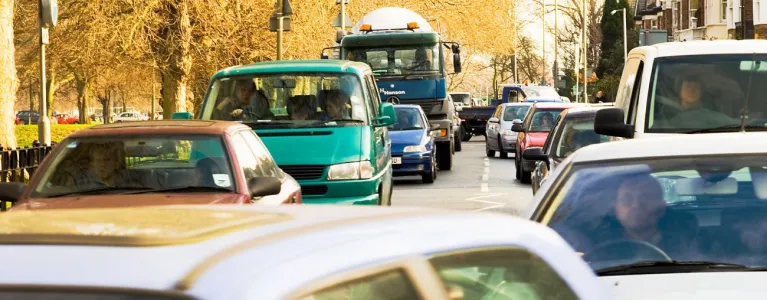
London’s traffic gridlock should be tackled with smart road pricing according to a new report – Caroline Russell is again urging the Mayor to adopt the idea.
An independent report by Integrated Transport Planning (ITP) commissioned by TfL, made nine other recommendations, including workplace parking levies, to help bring down congestion in London that is predicted to cost £9.3bn by 2030.
Caroline Russell backed smart road charging – where drivers are charged by journey distance and how polluting their car is instead of a flat rate fee like the T-charge – in her recent response to the Mayor’s draft Transport Strategy. [2]
The Mayor is currently deciding on the policies to be included in his final 25-year Transport Strategy.
Caroline Russell says:
“I welcome the findings of this independent study – it highlights what I’ve been telling the Mayor, that we need smart road pricing to reduce traffic.
“Reducing traffic goes hand in hand with cutting air pollution and making sure the Mayor can bring his Healthy Streets vision to life. No one want to live and work around busy, traffic fume-clogged roads.
“Traffic blights the lives of Londoners, making our streets unpleasant and hostile places to be. The Mayor must adopt these recommendations of his own study and include them in his final Transport Strategy.”
The report also identified emerging traffic patterns and changes in how people travel as the main causes of congestion, such as an increase in van and private hire journeys.
Notes to editors
The study was first suggested in an MoU between HM treasury, DCLG, and the Mayor: https://www.gov.uk/government/uploads/system/uploads/attachment_data/file/597291/London-Devolution-MoU.pdf
[1] Understanding and Managing Congestion, an independent report produced by Integrated Transport Planning (ITP) for TfL on behalf of the GLA https://tfl.gov.uk/corporate/publications-and-reports/road-space
The independent report recommends:
- Prioritising the most efficient use of road space, such as walking, cycling and public transport when designing new road schemes
- Adopting the policy of introducing variable, distance-based road user charging at a London-wide level. Schemes should be designed to optimise air quality, carbon and congestion benefits. Revenue from schemes should be used to improve public transport, walking and cycling
- Reviewing the present Congestion Charge exemptions and discounts
- Lobbying the Government to review the present regulatory regime for private hire vehicles
- Supporting freight by developing a London-wide integrated system of consolidation centres; encouraging sustainable delivery methods such as cycle freight and exploring the potential for freight-only lanes
- Supporting implementation of workplace parking levies by London boroughs
- Further delivery of bus priority schemes and explore the potential for freight-only lanes
- Expanding and strengthening permit schemes for works that affect road space
- Promoting sustainable travel choices by ensuring that new developments have public transport links and accessible facilities
- Continued investment in intelligent traffic management systems
[2] Caroline Russell response to the Mayor’s draft Transport Strategy, Nov 2017
https://www.london.gov.uk/sites/default/files/2017_10_02_transport_strategy_response_caroline_russell.pdf